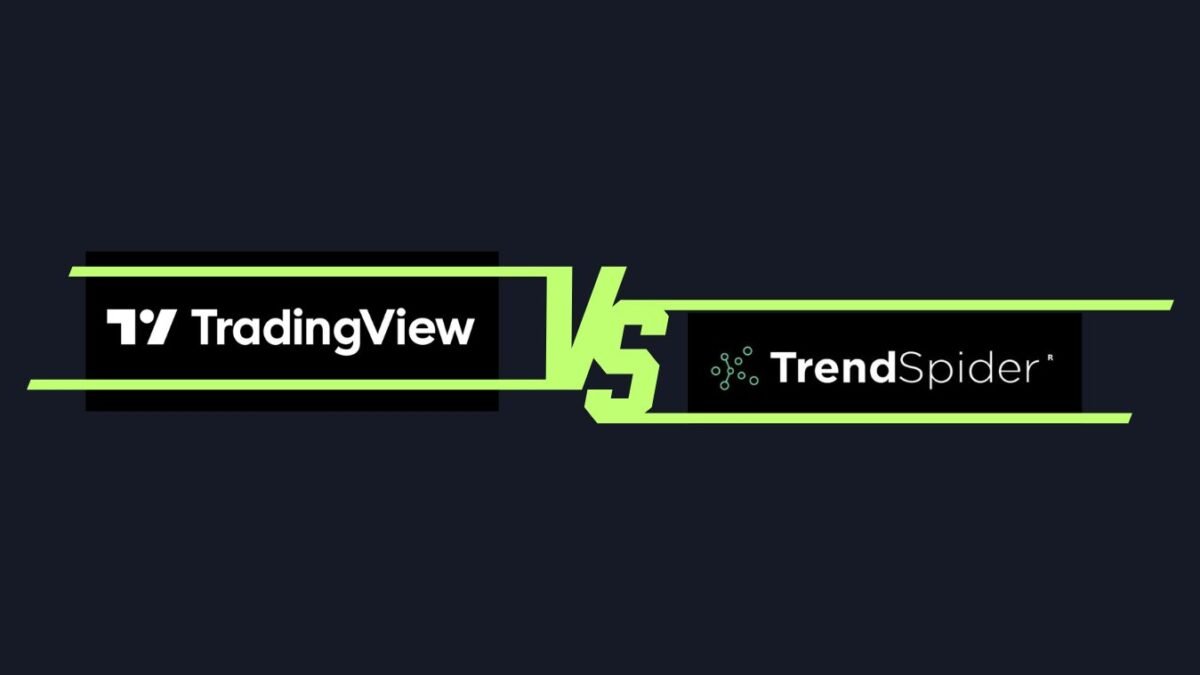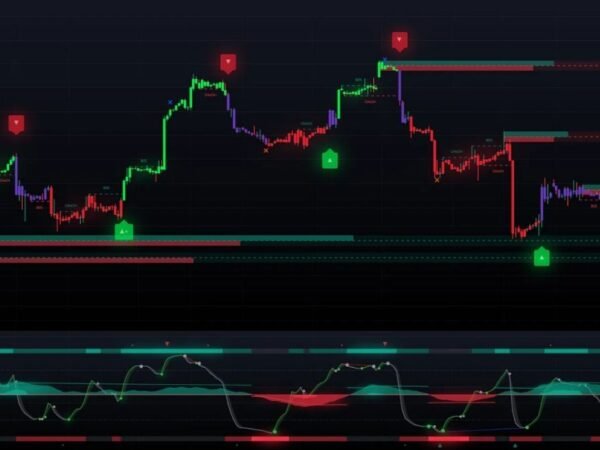When deciding on the best platform for technical analysis, two popular choices often come to mind: TradingView vs TrendSpider. Both platforms offer a range of tools designed to help traders make informed decisions. But how do you choose between them? In this article, we’ll dive into the key differences between TradingView and TrendSpider to help you determine which platform is best suited for your trading needs. By comparing their features, usability, and pricing, you’ll have all the information needed to make the right choice.
TradingView is a cloud-based charting and social-networking software for traders and investors. It provides powerful charting tools, real-time market data, and a large community of traders sharing ideas. TrendSpider, on the other hand, focuses on automation and AI-driven analysis, allowing traders to automate their technical analysis with features like automated trendline detection and multi-timeframe analysis.
TradingView is ideal for those who appreciate a comprehensive set of charting tools and a strong community aspect. Examples include advanced chart types, Pine Script for custom indicators, and a public idea sharing forum. TrendSpider excels for traders who want to minimize manual work with its automated features, such as dynamic price alerts and automatic candlestick pattern detection.
| Feature | TradingView | TrendSpider |
|---|---|---|
| User Interface | Customizable with a wide range of indicators | Intuitive with automated analysis tools |
| Automation | Limited, relies on custom scripting (Pine Script) | High, with AI-driven automation |
| Community & Social | Strong community with idea sharing | Limited community features |
| Price Alerts | Manual setup | Automated, including multi-timeframe alerts |
| Learning Resources | Extensive, with community and educational content | Focused on tool usage and market analysis |
Tips: If you prefer a platform with extensive social features and customization options, go for TradingView. However, if you want to save time with automated analysis, TrendSpider is a better choice.
Luxalgo: A Comprehensive Luxalgo Review
Are you still unsure which platform is best for your trading style? Don’t worry! We’re here to help you navigate the choice between TradingView and TrendSpider. As you continue reading, you’ll discover in-depth comparisons, real user insights, and expert tips to enhance your trading strategy. Whether you’re a beginner or an experienced trader, understanding these platforms’ unique offerings will empower you to make more informed decisions. Keep reading to find out which tool can better serve your trading goals.
TradingView vs TrendSpider: Which One’s Right for You?
When I was checking out TradingView and TrendSpider, I noticed some big differences in their pricing and features that could really change how I trade.
Pricing: What’s the Damage?
Money talks, right? TradingView gives you a free option to start with, plus four paid plans:
| Plan | Monthly Cost |
|---|---|
| Pro | $14.95 |
| Pro+ | $29.95 |
| Premium | $59.95 |
| Ultimate | $499.95 |
You can save some cash if you pay yearly (TrendSpider).
TrendSpider, on the other hand, is pricier at every level. So, you gotta ask yourself if those extra features are worth the extra bucks.
Tech and Features: What’s Under the Hood?
When it comes to tech, TrendSpider is like a high-tech gadget. It can spot over 200 candlestick patterns, way more than TradingView’s limited selection (FinMasters).
TrendSpider also lets you backtest your strategies without writing a single line of code. Perfect for quick setups. TradingView? You’ll need to learn Pine Script to do the same, which might be a bit of a headache for some (FinMasters).
The Bottom Line
Choosing between TradingView and TrendSpider really comes down to what you need, how much you’re willing to spend, and if TrendSpider’s advanced features fit your trading style.
Charting and Analysis Capabilities
When it comes to charting and analysis, both TradingView and TrendSpider bring something to the table for different trading styles. Let’s dig into their features, especially in candlestick pattern recognition and technical indicators.
Candlestick Pattern Recognition
TrendSpider shines here with its tech-savvy approach, spotting over 200 different candlestick patterns. This wide range helps traders get a better grip on market moves and potential reversals. On the flip side, TradingView’s automated pattern recognition is limited to a handful of popular chart patterns (FinMasters).
| Features | TradingView | TrendSpider |
|---|---|---|
| Pattern Recognition | Few patterns | Over 200 patterns |
| Automated Analysis | Basic features | Advanced automated analysis |
| Unique Chart Styles | Standard candlestick charts | Raindrop charts for volume analysis |
TrendSpider also offers automated chart pattern analysis, including Fibonacci sequences, trendlines, and support and resistance levels. This is a game changer for traders who like to automate their analysis (CoinCodex).
Technical Indicators and Screening Tools
Both platforms have stock screener features that automatically analyze tons of stocks, highlighting those that meet your criteria. They also include backtesting capabilities using historical price data to test different trading strategies (CoinCodex).
TrendSpider stands out with its market scanner, boasting over 70 presets for spotting trading opportunities. This is a lifesaver for traders who want to quickly find potential trades without digging through endless charts. The platform also offers alternative data sources, like a news feed from Benzinga Pro and sentiment analysis based on Reddit posts, making trading decisions a bit easier (CoinCodex).
| Features | TradingView | TrendSpider |
|---|---|---|
| Stock Screener | Yes | Yes |
| Backtesting | Yes | Yes |
| Market Scanner | Limited | Over 70 presets |
| Alternative Data Sources | Basic news feeds | Benzinga Pro, Reddit sentiment |
In a nutshell, while TradingView offers solid analysis tools, TrendSpider’s advanced candlestick pattern recognition and comprehensive market scanning capabilities make it a strong contender for traders looking for powerful charting and analysis tools.
Alert Systems and Notifications
I’ve spent some time comparing TradingView and TrendSpider, and both platforms offer solid alert systems that can really boost your trading game. Alerts are key for keeping up with market movements, and each platform has its own strengths here.
Customizing Alerts
Both TradingView and TrendSpider let you set up alerts based on a bunch of criteria. You can use price action, technical indicators, or even custom strategies you come up with. I love how both platforms let traders tweak their alert settings to fit their style.
Here’s a quick look at how their alert customization stacks up:
| Feature | TradingView | TrendSpider |
|---|---|---|
| Price Action Alerts | Yes | Yes |
| Technical Indicators | Yes | Yes |
| Custom Strategies | Yes | Yes |
| Automated Alerts | Yes (via SMS, email, webhooks) | Yes (via SMS, email, webhooks) |
| Pattern Recognition Alerts | No | Yes (automated chart pattern analysis) |
Both platforms send alerts through different channels, so you get timely notifications wherever you are.
How Alerts Are Delivered
When it comes to how alerts are delivered, both TradingView and TrendSpider do a great job. They offer alerts via SMS, email, and webhooks, which is awesome for automating your trading strategies. This feature is a lifesaver for staying on top of market changes without being glued to your screen.
| Delivery Method | TradingView | TrendSpider |
|---|---|---|
| SMS Alerts | Yes | Yes |
| Email Alerts | Yes | Yes |
| Webhooks | Yes | Yes |
| Automation | Yes (integrates with other services) | Yes (trading bots without coding) |
TrendSpider shines with its ability to use trading bots without needing to know how to code. This is perfect for folks like me who want to streamline their trading process and focus on strategy.
In a nutshell, both TradingView and TrendSpider offer top-notch alert systems that meet traders’ needs. Choosing between them might come down to which specific features match your trading style.
Backtesting and Strategy Development
Trading’s a wild ride, and having the right tools can make all the difference. Backtesting and strategy development are key to making smart moves. Let’s break down how TradingView and TrendSpider stack up.
Strategy Creation Without Coding
TrendSpider’s got a killer feature: you can whip up custom trading strategies without touching a single line of code. Perfect for folks who’d rather not mess with programming. I love this because it means I can get a strategy up and running fast, no coding headaches. TradingView, though, makes you learn Pine Script. It’s a solid language, but not everyone’s cup of tea (FinMasters).
| Feature | TrendSpider | TradingView |
|---|---|---|
| No Coding Required | Yes | No |
| Coding Language | N/A | Pine Script |
| Quick Setup | Yes | Requires Learning |
Customization and User-Friendliness
Customization’s where TrendSpider really shines. Its automation engine lets you automate chart patterns and create trading bots without coding. This is a game changer for me—focus on strategy, not coding. The platform’s designed with traders in mind, making it easy to plan and execute trades like a pro (TrendSpider).
TradingView, on the other hand, lets you create custom indicators and strategies with Pine Script. It’s flexible, sure, but not as approachable if you prefer simplicity (CoinCodex).
| Feature | TrendSpider | TradingView |
|---|---|---|
| Automation Engine | Fully Customizable | Limited |
| User-Friendly Design | Yes | Moderate |
| Custom Indicators | Yes (JavaScript as of May 2023) | Yes (Pine Script) |
The Bottom Line
Both platforms bring something to the table for backtesting and strategy development, but they cater to different crowds. TrendSpider’s no-code approach and customization options make it a go-to for traders who want ease and automation. TradingView is for those who don’t mind diving into code for deeper customization. Choose what fits your style, and happy trading!
Subscription Plans and Accessibility
Alright, let’s cut through the noise and get to the good stuff. If you’re diving into trading platforms, you gotta know what you’re paying for and what you get. Let’s break down what TradingView and TrendSpider bring to the table so you can make a smart choice.
TradingView Subscription Tiers
TradingView’s got a freemium model, meaning you can start for free and then decide if you want to pay for more goodies. Here’s the lowdown:
| Plan | Monthly Price | Features |
|---|---|---|
| Free | $0 | Basic stuff, limited indicators, and yes, ads |
| Pro | $14.95 | More indicators, no ads |
| Pro+ | $29.95 | Even more features, extra indicators |
| Premium | $59.95 | All the bells and whistles, unlimited alerts |
| Ultimate | $499.95 | Top-tier features, VIP customer support |
You can snag discounts if you pay annually, which is a sweet deal for serious traders (TrendSpider).
TrendSpider Pricing and Plans
TrendSpider keeps it simple with three main plans. Here’s the scoop:
| Plan | Monthly Price | Features |
|---|---|---|
| Basic | $29 | Essential tools for traders |
| Advanced | $39 | More features, including automated analysis |
| Elite | $79 | All features, priority support, and advanced tools |
No free tier here, but you get what you pay for—advanced tech and features designed to up your trading game.
So, what’s the takeaway? TradingView gives you flexibility with its freemium model, while TrendSpider offers a streamlined, feature-packed experience. Whether you want to dip your toes in or go all-in, both platforms have something to offer. Happy trading!
Final Thoughts on TradingView vs TrendSpider
Choosing between TradingView and TrendSpider depends largely on your trading style and preferences. TradingView offers a robust charting experience and a strong community for idea sharing, making it an excellent choice for traders who value customizability and social interaction. TrendSpider’s strength lies in its automation and AI capabilities, ideal for traders looking to streamline their analysis process. By understanding the unique features and benefits of each platform, you can select the one that aligns best with your trading strategy.
FAQs about “TradingView vs TrendSpider”
Q: What are the main differences between TradingView and TrendSpider?
A: TradingView is known for its extensive charting tools and a large community of traders sharing ideas, while TrendSpider focuses on automated analysis features like AI-driven trendline detection and multi-timeframe alerts. TradingView offers more flexibility and customization, while TrendSpider aims to simplify and automate trading strategies.
Q: Is TrendSpider suitable for beginners?
A: Yes, TrendSpider can be suitable for beginners, especially those interested in automating their technical analysis. Its user-friendly interface and automated features can help new traders avoid common mistakes and learn faster. However, beginners should also explore TradingView for its community and educational resources.
Q: Which platform offers better mobile support?
A: TradingView has a more comprehensive mobile app, supporting both Android and iOS, which allows users to view charts, set alerts, and participate in the community. TrendSpider’s mobile app is more limited but offers essential features like viewing alerts and managing watchlists.
Q: How do the pricing plans of TradingView and TrendSpider compare?
A: TradingView offers multiple pricing tiers, including a free version with basic features, and paid plans ranging from $14.95 to $59.95 per month. TrendSpider also offers tiered pricing, starting from $39 per month up to $79 per month, with each plan offering different levels of automation and features.
Q: Can I use both TradingView and TrendSpider together?
A: Yes, some traders use both platforms to leverage the unique advantages each offers. For example, you might use TradingView for its charting tools and community insights, while using TrendSpider for its automated analysis and alert features.
Q: What are the community features like on TradingView compared to TrendSpider?
A: TradingView has a strong community with features like public idea sharing, private chats, and user-generated scripts and indicators. TrendSpider has fewer community features but focuses on tool usage and market analysis.




